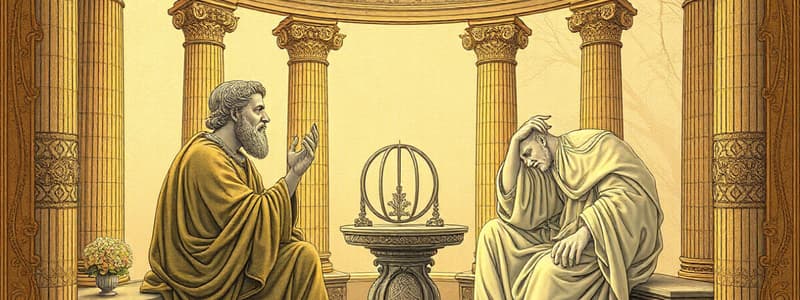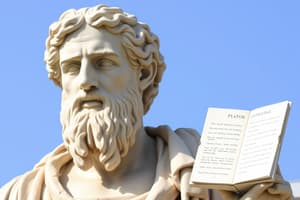Podcast
Questions and Answers
What does Socrates' method primarily rely on during dialogues?
What does Socrates' method primarily rely on during dialogues?
- Asking a series of pointed questions (correct)
- Summarizing the viewpoints of others
- Presenting his own arguments convincingly
- Making definitive statements about virtue
How does the Protagoras contribute to the understanding of virtue?
How does the Protagoras contribute to the understanding of virtue?
- It dismisses the importance of dialogue in philosophical inquiry.
- It emphasizes the theoretical aspects of virtue without practical implications.
- It provides a definitive answer to what virtue is.
- It highlights the political and practical significance of ethics in society. (correct)
What is a key result of Socratic questioning according to the content?
What is a key result of Socratic questioning according to the content?
- It promotes self-examination and uncovering inconsistencies. (correct)
- It leads to consensus on difficult questions.
- It minimizes the role of dialogue in understanding virtue.
- It provides immediate clarity on moral issues.
What is emphasized as a crucial aspect of Socratic dialogues?
What is emphasized as a crucial aspect of Socratic dialogues?
What uncertainty is raised concerning the teaching of virtue?
What uncertainty is raised concerning the teaching of virtue?
What is Protagoras's main assertion regarding virtue?
What is Protagoras's main assertion regarding virtue?
How does Socrates challenge Protagoras's thesis on virtue?
How does Socrates challenge Protagoras's thesis on virtue?
What role does Protagoras assign to political knowledge in the context of virtue?
What role does Protagoras assign to political knowledge in the context of virtue?
What fundamental question does Socrates raise regarding the teachability of virtue?
What fundamental question does Socrates raise regarding the teachability of virtue?
Which argument does Protagoras use to support the idea that virtue can be taught?
Which argument does Protagoras use to support the idea that virtue can be taught?
What concern does Socrates raise about virtue despite perceived instruction?
What concern does Socrates raise about virtue despite perceived instruction?
What is a key distinction made by Protagoras regarding virtue?
What is a key distinction made by Protagoras regarding virtue?
What does Socrates systematically challenge about Protagoras's view on virtue?
What does Socrates systematically challenge about Protagoras's view on virtue?
Flashcards
The Socratic Method
The Socratic Method
Socrates' method of questioning and engaging in dialogue to identify inconsistencies and uncover true knowledge.
Importance of Self-Examination
Importance of Self-Examination
Emphasizes the value of self-reflection and questioning one's assumptions to understand virtue and the good life.
Virtue in Society
Virtue in Society
Examines the nature of virtue and justice in Athenian society, highlighting their significance in practical and political life.
Process of Philosophical Inquiry
Process of Philosophical Inquiry
Signup and view all the flashcards
Virtue as Learned and Innate
Virtue as Learned and Innate
Signup and view all the flashcards
Virtue (arete)
Virtue (arete)
Signup and view all the flashcards
Protagoras
Protagoras
Signup and view all the flashcards
Polis
Polis
Signup and view all the flashcards
Teaching
Teaching
Signup and view all the flashcards
Virtue as political knowledge
Virtue as political knowledge
Signup and view all the flashcards
Socrates's challenge
Socrates's challenge
Signup and view all the flashcards
Teachability of virtue
Teachability of virtue
Signup and view all the flashcards
Arguments against the teachability of virtue
Arguments against the teachability of virtue
Signup and view all the flashcards
Study Notes
Summary of Plato's Protagoras
- The Protagoras is a Platonic dialogue featuring Socrates, Protagoras, and other figures.
- It explores the nature of virtue and whether it can be taught.
- Socrates questions Protagoras's assertion that virtue can be taught.
- The dialogue is a complex examination of human nature and ethical knowledge in the context of Athenian society.
Protagoras's Thesis
- Protagoras argues that virtue (arete) is teachable.
- He posits a fundamental human capacity for "knowing the good," which is inextricably linked to political knowledge.
- He believes virtue is a collection of specific skills enabling effective citizen participation in the polis.
Socrates's Challenge
- Socrates challenges Protagoras's definition of virtue.
- Socrates seeks to understand if virtue is a skill or a knowledge, and if it can be broken down into discrete components and taught as such.
- He systematically dismantles Protagoras's arguments, questioning many crucial assumptions about the nature of teaching and learning virtue.
The Importance of Politics in Human Reasoning
- Protagoras sees virtue as inseparable from political knowledge, emphasizing that human beings are inherently social and need virtue for the smooth functioning of society within the polis.
- Protagoras' account of virtue is connected to his understanding of the polis as a social construct, rather than a singular individual concept.
- Protagoras highlights the practical benefits of having knowledge about justice and how it impacts one's role in Athenian society.
The Question of Teaching Virtue
- The core of the debate centers on the possibility of teaching virtue, focusing on whether a skill can be taught and what is needed for its acquisition.
- Socrates questions the specific knowledge needed for the virtues and the connection between knowledge and action.
Arguments for and Against the Teachability of Virtue
- Protagoras presents various demonstrations of the argument that virtue is teachable, focusing on practical skills like courtroom oratory.
- He argues political and social roles embodying virtuosity require education and experience, suggesting they can be taught.
- Socrates raises arguments against the teachability of virtue, highlighting contrary actions among individuals despite perceived instruction as evidence against the efficacy of abstract education.
- He emphasizes that virtue appears to be both the result of practice and possibly natural inclination, thus making its teaching uncertain.
The Socratic Method
- The dialogue exemplifies Socrates' method of questioning.
- Rather than presenting arguments himself, he asks a series of pointed questions to expose inconsistencies in other's assumptions and arguments.
- He promotes self-examination as a crucial step towards understanding virtue and the good life, through the persistent questioning of assumptions and arguments.
The Importance of the Dialogue
- The Protagoras contains elements useful for an enduring account of virtue, highlighting the practical and political significance of ethics and justice within Athenian society.
- It prompts further questions and considerations on the nature of knowledge, virtue, and the good life in any given society.
- The dialogue is an excellent illustration of the nature of philosophical inquiry, showcasing not a definite "resolution," but a structured process of exploring fundamental questions about human nature, knowledge, and ethics.
Studying That Suits You
Use AI to generate personalized quizzes and flashcards to suit your learning preferences.




